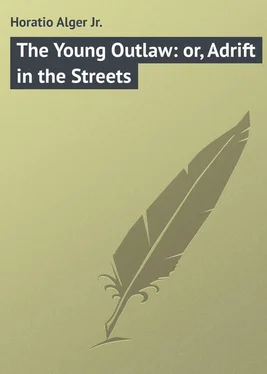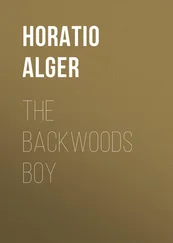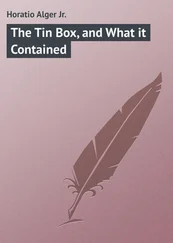Horatio Alger - The Young Outlaw - or, Adrift in the Streets
Здесь есть возможность читать онлайн «Horatio Alger - The Young Outlaw - or, Adrift in the Streets» — ознакомительный отрывок электронной книги совершенно бесплатно, а после прочтения отрывка купить полную версию. В некоторых случаях можно слушать аудио, скачать через торрент в формате fb2 и присутствует краткое содержание. Жанр: foreign_language, foreign_prose, foreign_children, на английском языке. Описание произведения, (предисловие) а так же отзывы посетителей доступны на портале библиотеки ЛибКат.
- Название:The Young Outlaw: or, Adrift in the Streets
- Автор:
- Жанр:
- Год:неизвестен
- ISBN:нет данных
- Рейтинг книги:5 / 5. Голосов: 1
-
Избранное:Добавить в избранное
- Отзывы:
-
Ваша оценка:
- 100
- 1
- 2
- 3
- 4
- 5
The Young Outlaw: or, Adrift in the Streets: краткое содержание, описание и аннотация
Предлагаем к чтению аннотацию, описание, краткое содержание или предисловие (зависит от того, что написал сам автор книги «The Young Outlaw: or, Adrift in the Streets»). Если вы не нашли необходимую информацию о книге — напишите в комментариях, мы постараемся отыскать её.
The Young Outlaw: or, Adrift in the Streets — читать онлайн ознакомительный отрывок
Ниже представлен текст книги, разбитый по страницам. Система сохранения места последней прочитанной страницы, позволяет с удобством читать онлайн бесплатно книгу «The Young Outlaw: or, Adrift in the Streets», без необходимости каждый раз заново искать на чём Вы остановились. Поставьте закладку, и сможете в любой момент перейти на страницу, на которой закончили чтение.
Интервал:
Закладка:
Alger Horatio, Jr.
The Young Outlaw; or, Adrift in the Streets
PREFACE
"The Young Outlaw" is the sixth volume of the Tattered Tom Series, and the twelfth of the stories which are wholly or mainly devoted to street-life in New York. The story carries its moral with it, and the writer has little fear that the Young Outlaw will be selected as a model by the boys who may read his adventures, and be amused by the scrapes into which he manages to fall. In previous volumes he has endeavored to show that even a street-boy, by enterprise, industry and integrity, may hope to become a useful and respected citizen. In the present narration he aims to exhibit the opposite side of the picture, and point out the natural consequences of the lack of these qualities.
This may be a proper occasion to express gratitude for the very remarkable favor with which these stories of humble life have been received throughout the country. The writer is glad to believe that they have done something to draw attention to a neglected class of children, whom it is important to elevate and redeem.
NEW YORK, March 25, 1875.
CHAPTER I.
THE YOUNG OUTLAW
"Boy, is this Canal Street?"
The speaker was evidently from the country. He was a tall man, with prominent features, and a face seamed and wrinkled by the passage of nearly seventy years. He wore a rusty cloak, in the style of thirty years gone by, and his clothing generally was of a fashion seldom seen on Broadway.
The boy addressed was leaning against a lamppost, with both hands in his pockets. His clothes were soiled and ragged, a soft hat, which looked as if it had served in its varied career as a foot-ball, was thrust carelessly on his head. He looked like a genuine representative of the "street Arab," with no thought for to-morrow and its needs, and contented if he could only make sure of a square meal to-day. His face was dirty, and marked by a mingled expression of fun and impudence; but the features were not unpleasing, and, had he been clean and neatly dressed, he would undoubtedly have been considered good-looking.
He turned quickly on being addressed, and started perceptibly, as his glance met the inquiring look of the tall, stranger. He seemed at first disposed to run away, but this intention was succeeded by a desire to have some fun with the old man.
"Canal Street's about a mile off. I'll show yer the way for ten cents."
"A mile off? That's strange," said the old man, puzzled. "They told me at the Astor House it was only about ten minutes walk, straight up."
"That's where you got sold, gov'nor. Give me ten cents, and you won't have no more trouble."
"Are you sure you know Canal Street, yourself?" said the old man, perplexed. "They'd ought to know at the hotel."
"I'd ought to know too. That's where my store is."
"Your store!" ejaculated the old man, fixing his eyes upon his ragged companion, who certainly looked very little like a New York merchant.
"In course. Don't I keep a cigar store at No. 95?"
"I hope you don't smoke yourself," said the deacon (for he was a deacon), solemnly.
"Yes, I do. My constitushun requires it."
"My boy, you are doing a lasting injury to your health," said the old man, impressively.
"Oh, I'm tough. I kin stand it. Better give me a dime, and let me show yer the way."
The deacon was in a hurry to get to Canal Street, and after some hesitation, for he was fond of money, he drew out ten cents, and handed it to his ragged companion.
"There, my boy, show me the way. I should think you might have done it for nothing."
"That aint the way we do business in the city, gov'nor."
"Well, go ahead, I'm in a hurry."
"You needn't be, for this is Canal Street," said the boy, edging off a little.
"Then you've swindled me," said the deacon, wrathfully. "Give me back that ten cents."
"Not if I know it," said the boy, mockingly. "That aint the way we do business in the city. I'm goin to buy two five-cent cigars with that money."
"You said you kept a cigar-store yourself," said the deacon, with sudden recollection.
"You mustn't believe all you hear, gov'nor," said the boy, laughing saucily.
"Well now, if you aint a bad boy," said the old man.
"What's the odds as long as you're happy?" said the young Arab, carelessly.
Here was a good chance for a moral lesson, and the deacon felt that it was his duty to point out to the young reprobate the error of his ways.
"My young friend," he said, "how can you expect to be happy when you lie and cheat? Such men are never happy."
"Aint they though? You bet I'll be happy when I'm smokin' the two cigars I'm goin to buy."
"Keep the money, but don't buy the cigars," said the deacon, religion getting the better of his love of money. "Buy yourself some clothes. You appear to need them."
"Buy clo'es with ten cents!" repeated the boy, humorously.
"At any rate, devote the money to a useful purpose, and I shall not mind being cheated out of it. If you keep on this way, you'll end in the gallus."
"That's comin' it rather strong, gov'nor. Hangin's played out in New York. I guess I'm all right."
"I'm afraid you're all wrong, my boy. You're travellin' to destruction."
"Let's change the subject," said the street boy. "You're gittin' personal, and I don't like personal remarks. What'll you bet I can't tell your name?"
"Bet!" ejaculated the deacon, horrified.
"Yes, gov'nor. I'll bet you a quarter I kin tell your name."
"I never bet. It's wicked," said the old man, with emphasis.
"Well, we won't bet, then," said the boy. "Only, if I tell your name right, you give me ten cents. If I don't get it right, I'll give back this dime you gave me. Aint that fair?"
The deacon might have been led to suspect that there was not much difference between the boy's proposal, and the iniquity of a bet, but his mind was rather possessed by the thought that here was a good chance to recover the money out of which he had been so adroitly cheated. Surely there was no wrong in recovering that, as of course he would do, for how could a ragged street boy tell the name of one who lived a hundred and fifty miles distant, in a small country town?
"I'll do it," said the deacon.
"You'll give me ten cents if I tell your name?"
"Yes, and you'll give me back the money I give you if you can't tell."
"That's it, gov'nor."
"Then what's my name, my boy?" and the deacon extended his hand in readiness to receive the forfeit of a wrong answer.
"Deacon John Hopkins," answered the boy, confidently.
The effect on the old man was startling. He was never more surprised in his life. He stared at the boy open-mouthed, in bewilderment and wonder.
"Well, I declare!" he ejaculated. "I never heard of such a thing."
"Aint I right, gov'nor?"
"Yes, my boy, you're right; but how on earth did you find out?"
"Give me the money, and I'll tell you;" and the boy extended his hand.
The deacon drew the money from his vest-pocket, and handed it to the young Arab, without remonstrance.
"Now tell me, my boy, how you know'd me."
The boy edged off a few feet, then lifted his venerable hat so as to display the whole of his face.
"I'd ought to know you, deacon," he said; "I'm Sam Barker."
"By gracious, if it aint Sam!" ejaculated the old man. "Hallo! stop, I say!"
But Sam was half-way across the street. The deacon hesitated an instant, and then dashed after him, his long cloak floating in the wind, and his hat unconsciously pushed back on the top of his head.
"Stop, you Sam!" he shouted.
But Sam, with his head over his shoulder, already three rods in advance, grinned provokingly, but appeared to have no intention of stopping. The deacon was not used to running, nor did he make due allowance for the difficulty of navigating the crowded streets of the metropolis. He dashed headlong into an apple-stand, and suffered disastrous shipwreck. The apple-stand was overturned, the deacon's hat flew off, and he found himself sprawling on the sidewalk, with apples rolling in all directions around him, and an angry dame showering maledictions upon him, and demanding compensation for damages.
Читать дальшеИнтервал:
Закладка:
Похожие книги на «The Young Outlaw: or, Adrift in the Streets»
Представляем Вашему вниманию похожие книги на «The Young Outlaw: or, Adrift in the Streets» списком для выбора. Мы отобрали схожую по названию и смыслу литературу в надежде предоставить читателям больше вариантов отыскать новые, интересные, ещё непрочитанные произведения.
Обсуждение, отзывы о книге «The Young Outlaw: or, Adrift in the Streets» и просто собственные мнения читателей. Оставьте ваши комментарии, напишите, что Вы думаете о произведении, его смысле или главных героях. Укажите что конкретно понравилось, а что нет, и почему Вы так считаете.












